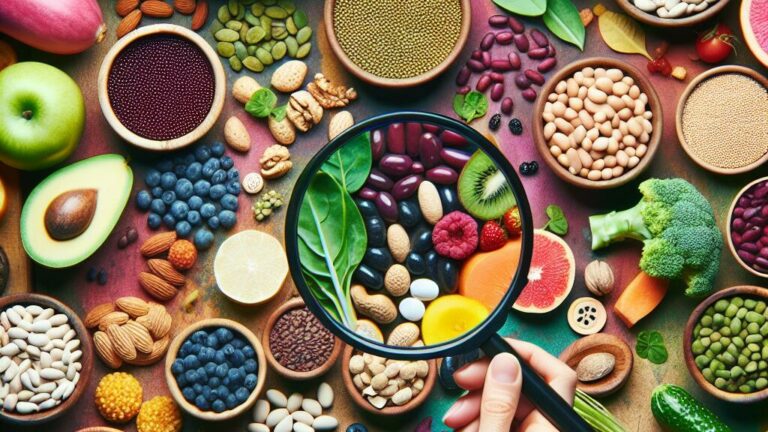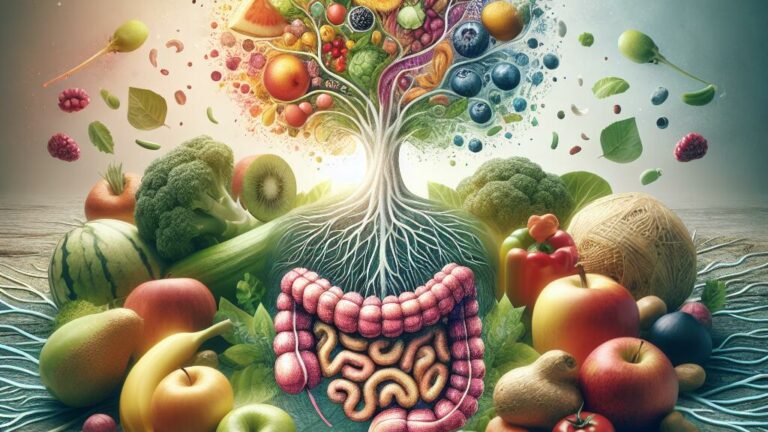Plant Based Diet for Weight Loss
Table Of Contents
Plant Based Diet For Weight Loss | Unlock the Benefits of a Plant-Based Diet for Weight Loss
Key Takeaways
- Comprehending plant-focused eating habits can aid in shedding pounds.
- Advantages of a plant-focused diet include effective weight management.
- Initiating a plant-focused eating plan involves practical steps.
- Addressing obstacles in embracing plant-based eating is essential for success.
- Culinary inspirations and meal suggestions support weight reduction efforts.
- Real-life achievements and endorsements highlight the effectiveness of plant-based diets.
Plant Based Diet For Weight Loss | Understanding PlantBased Diets
A plant-based diet for weight loss focuses on whole foods primarily derived from plants, including fruits, vegetables, whole grains, nuts, and seeds. This approach emphasizes the consumption of nutrient-dense foods that are low in calories but high in fiber and essential nutrients. By adopting a whole-food plant-based diet, individuals can achieve significant weight loss while enjoying a variety of delicious meals. Plant-based diets not only support weight loss but also promote overall health and sustainability. Many weight management diets highlight the benefits of plant-based nutrition, making it a popular choice for those seeking effective weight loss programs. Understanding the fundamentals of a plant-based diet is crucial for anyone looking to embark on a successful journey toward healthier living and effective dieting.
Plant Based Diet for Weight Loss | What Constitutes a PlantBased Diet?
A Plant Based Diet for Weight Loss typically focuses on whole, unprocessed foods derived from plants. This includes fruits, vegetables, legumes, whole grains, nuts, and seeds. People following this diet often aim for a balanced diet that is low in saturated fats and high in fiber. These low-calorie diets can support losing weight effectively. Many individuals have successfully lost weight by adopting a Plant Based Diet for Weight Loss as it encourages the consumption of nutrient-dense foods that provide the body with essential vitamins and minerals.
Low-fat diets rich in plant-based foods promote weight reduction while still delivering satisfying meals. A diet supplemented with a variety of vegetables and fruits allows individuals to feel fuller without consuming excessive calories. This approach not only aids in losing weight but also fosters overall health. As people transition to a Plant Based Diet for Weight Loss, they often report significant changes in their energy levels and well-being.
Types of PlantBased Diets
A Plant Based Diet for Weight Loss encompasses various dietary approaches focused on plant foods. One popular option is the vegan diet, which excludes all animal products. This diet emphasizes whole, unprocessed plant foods, making it a powerful choice for those seeking weight reductions. Some individuals may opt for a vegetarian diet, allowing limited animal-derived foods like dairy and eggs. These flexible approaches enable individuals to tailor their diets while still benefiting from the nutritional advantages of plant-based foods.
Another approach is the raw vegan diet, which consists entirely of uncooked plant foods. This very low-calorie diet may appeal to those looking to maximize nutrient intake while minimizing caloric consumption. Calorie restricted diets can also be structured around plant-based food, focusing on portion control without sacrificing nutrition. Diets supplemented with plant foods are effective for promoting weight loss by providing essential nutrients, boosting metabolism, and enhancing satiety. The diversity within plant-based diets allows for a personalized journey toward healthier eating.
- A vegan diet excludes all animal products such as meat, poultry, fish, dairy, and eggs.
- The vegetarian diet includes some animal products, primarily dairy and eggs, offering more flexibility.
- A raw vegan diet allows only uncooked plant foods, focusing on maximum nutrient intake.
- Calorie-restricted plant-based diets emphasize portion control to promote weight loss.
- Diets enriched with plant foods can enhance metabolism and increase feelings of fullness.
- The diversity in plant-based diets caters to individual preferences and nutritional needs.
- Personalizing a plant-based diet can lead to a sustainable and enjoyable eating experience.
Benefits of a PlantBased Diet for Weight Loss
The Plant Based Diet for Weight Loss offers numerous advantages, particularly for those looking to shed excess pounds. This approach aligns with the principles of dietetics, emphasizing whole, minimally processed foods that are rich in nutrients and lower in calories. Unlike traditional western diets that often include high-fat and high-sugar options, plant-based eating focuses on fruits, vegetables, legumes, nuts, and whole grains, making it easier for individuals to manage their dietary restrictions. Studies show that vegan diets and vegetarian diets can lead to greater weight loss compared to low-carbohydrate diets. Adopting a semi-vegetarian diet can also help individuals reap the benefits of a plant-focused lifestyle while still allowing for some flexibility. Dieticians frequently recommend the Plant Based Diet for Weight Loss as it not only aids in weight management but also contributes to overall health and wellness.
| Benefits | Description | Supporting Evidence |
|---|---|---|
| Weight Loss | Higher fiber content promotes satiety, reducing overall calorie intake. | Studies show faster weight loss in plant-based dieters. |
| Improved Heart Health | Lower in saturated fats and cholesterol, reducing heart disease risk. | Research indicates significant reductions in blood pressure and cholesterol levels. |
| Increased Energy Levels | Nutrient-dense options provide sustained energy without crashes. | Many dieters report improved energy and reduced fatigue. |
| Better Digestion | High fiber intake aids in digestion and prevents constipation. | Dieticians recommend fiber-rich foods for digestive health benefits. |
Nutritional Advantages of PlantBased Nutrition
A Plant Based Diet for Weight Loss offers numerous nutritional advantages that can lead to effective dietary weight loss. This diet emphasizes whole, minimally processed foods rich in essential nutrients. Unlike non-plant-based diets, a plant-food diet typically includes low-fat plant-based diets that provide adequate fiber, vitamins, and minerals. Many people find that these diets are lower in calories compared to high-protein diets or high-carbohydrate diets, making it easier to achieve and maintain a healthy weight.
High-glycemic diets can lead to energy spikes and crashes, while low-glycemic diets promote steady energy levels, contributing to better appetite control. A plant-based approach often emphasizes low-glycemic food options, which are beneficial for those looking to manage their weight. For individuals seeking alternatives to carbohydrate-restricted diets, a diverse array of plant-based foods can ensure sufficient protein intake while still being enjoyable. This balance allows for a sustainable method of eating that supports long-term weight loss goals.
How WholeFood PlantBased Diets Promote Weight Loss
Whole-food plant-based diets are a powerful approach for those pursuing the Plant Based Diet for Weight Loss. These dietary patterns focus on whole, minimally processed foods, which can lead to reduced caloric intake without sacrificing nutrition. Studies indicate that individuals following a plant-centered diet often consume lower amounts of saturated fats and sugars, contributing to weight loss. This shift to a plant-prominent diet is not just beneficial in terms of weight management; it also supports overall health by introducing a wealth of vitamins, minerals, and antioxidants.
Implementing a plant-based intervention diet can serve as an effective weight loss program. Many find that the high fiber content of plant-based diets helps promote satiety, reducing the likelihood of overeating. These plant-based intervention diets can shift the focus to nutrient-dense options, encouraging individuals to choose fruits, vegetables, legumes, and whole grains as staples of their meals. By embracing these plant-based dietary patterns, individuals not only enhance their chances of achieving weight loss goals but also pave the way for sustainable lifestyle changes that benefit long-term health.
Getting Started with a PlantBased Diet
A Plant Based Diet for Weight Loss serves as an effective weight loss tool, promoting healthy and sustainable habits. Research in weight loss consistently highlights the benefits of plant-based eating, illustrating how it can be a successful weight loss strategy for many individuals. Incorporating a variety of fruits, vegetables, whole grains, and legumes not only aids in achieving modest weight loss but also helps to prevent weight loss plateaus. Meals centered around plant-based foods allow for flexibility, enabling participants to include similar weight loss strategies that tailor to personal preferences. Understanding what makes this diet work is essential, as it empowers individuals to stick with their weight loss journey while enjoying the flavorful options that plant-based nutrition provides.
Essential Foods for PlantBased Nutrition
A successful Plant Based Diet for Weight Loss hinges on incorporating a diverse range of essential foods that enhance the diet composition. Whole grains, legumes, fruits, and vegetables are integral to this eating pattern. These foods provide vital nutrients while promoting satiety, making them ideal for individuals on a weight loss journey. By focusing on nutrient-dense options, diet modifications can be made that support overall health and improve weight loss outcomes.
Nuts and seeds also play a crucial role in a plant-based diet plan. They offer healthy fats and proteins that can assist in achieving weight loss goals without sacrificing flavor or satisfaction. By embracing a variety of plant-based foods, individuals can tailor their diet condition to fit their weight loss efforts effectively. Popular weight loss strategies often emphasize a balanced diet, and adopting a plant-based eating pattern can yield significant diet benefits throughout the weight loss process.
Meal Planning Tips for Weight Loss Success
Creating a successful meal plan involves incorporating a variety of foods that align with the diet criteria of a Plant Based Diet for Weight Loss. Focusing on whole, unprocessed foods ensures that your diet approach supports your weight loss goals. Emphasizing fruits, vegetables, whole grains, and legumes not only helps in weight loss but also promotes long-term weight loss maintenance. Adapting your meal plan to include appealing plant-based eating patterns can increase adherence to your preferred diet type, making it easier to achieve your weight loss objectives.
Establishing a balance in your meals can help achieve the weight loss hypothesis effectively. Planning meals ahead allows you to monitor calorie intake while ensuring you meet the necessary nutrient requirements. By sticking to specific diet patterns and meal prepping, you can streamline your grocery shopping, making it easier to stay committed to your Plant Based Diet for Weight Loss. This proactive approach supports weight loss regardless of the challenges that may arise, reinforcing your resolve to maintain a healthy lifestyle within the weight loss department.
Overcoming Challenges in Adopting PlantBased Diets
Transitioning to a Plant Based Diet for Weight Loss can present unique challenges, especially for those accustomed to traditional eating patterns. Many individuals experience weight loss struggles when adopting a particular diet strategy, as the shift from familiar meals to new options can be daunting. Effective weight loss interventions often require a tailored approach, making it essential to compare diets to find the most suitable option. Group-based weight loss programs can serve as a motivational tool, fostering a supportive environment that helps individuals navigate their journey. For some, achieving a notable milestone, such as a 50-pound weight loss, hinges on overcoming these initial obstacles. Embracing the nutritional benefits and making gradual changes can pave the way for sustained weight loss success with a Plant Based Diet for Weight Loss.
Common Misconceptions About PlantBased Diets
Many people believe that a Plant Based Diet for Weight Loss lacks sufficient protein or essential nutrients. They assume that eliminating animal products automatically leads to deficiencies. However, a well-planned plant-based diet can provide all necessary nutrients, supporting various diet types and weight loss goals. The focus on whole foods often leads to a higher diet quality, debunking the myth that a standard diet is superior for nutrition.
Another common misconception is that a plant-based diet is bland and unexciting. Numerous delicious diet recipes highlight the versatility and richness of plant-based ingredients. From vibrant salads to hearty stews, the options are vast and satisfying. This variety makes it easier for individuals to commit to their weight loss journey, ensuring that diet matter aligns with their preferences. Understanding different diets can illuminate how a Plant Based Diet for Weight Loss can be both enjoyable and effective.
| Misconception | Fact | Example |
|---|---|---|
| Plant-Based Diet Lacks Protein | A well-planned plant-based diet can provide ample protein from sources like beans, lentils, quinoa, and nuts. | 1 cup of cooked lentils has about 18 grams of protein. |
| It’s Bland and Unexciting | Plant-based diets can be diverse and flavorful with the right ingredients and cooking methods. | Spicy chickpea curry or a vibrant quinoa salad. |
| Plant-Based Diets are Expensive | Whole foods like grains, beans, and seasonal vegetables can be quite affordable. | A bag of beans provides multiple servings at a low cost compared to meat. |
| All Plant-Based Foods are Healthy | Processed plant-based foods can be high in sugars and unhealthy fats; whole food choices are best. | Choose whole grains and fresh produce over sugary cereals and snacks. |
Strategies for Staying Committed to a PlantBased Lifestyle
Staying committed to a Plant Based Diet for Weight Loss can be simplified by focusing on diet sustainability. Adopting a low-fat vegan diet often yields better results in clinical weight loss trials. Creating a meal plan that includes a variety of plant-based foods helps to prevent boredom and ensures nutrient variety. Understanding that diet matters is crucial, as it influences not only weight loss but overall health. By exploring different diet approaches and choices, individuals can find what works best for them, turning their plant-based journey into a lifestyle rather than a temporary fix.
Support systems play a significant role in maintaining commitment to a plant-based lifestyle. Engaging with communities that share similar dietary goals increases motivation and accountability. Participating in randomized weight loss groups that focus on a Plant Based Diet for Weight Loss can provide encouragement and share successful strategies. It’s important to recognize that transitioning from an animal-based diet requires patience and gradual changes. Setting realistic goals and celebrating small victories reinforces the positive aspects of this dietary choice, making the process more enjoyable and sustainable.
Recipes and Meal Ideas for Weight Loss
A Plant Based Diet for Weight Loss offers a variety of flavorful and satisfying meal options that can support individuals on their weight loss journeys. Focusing on a diet consisting of whole foods, plant-based meals can lead to significant short-term weight loss due to their lower calorie density and higher fiber content. Research shows that behavioral weight loss interventions centered around plant-protein consumption are effective in promoting healthier eating habits. These diets often increase overall diet quality, making them preferable to standard diets. Incorporating low-fat intervention diets combined with plant-based recipes can enhance the overall diet index, making it easier for individuals to achieve their goals while enjoying nutritious and delicious food.
Breakfast Options for a PlantBased Diet
A well-planned vegan diet can serve as a fantastic foundation for breakfast options in a Plant Based Diet for Weight Loss. Starting the day with a nutrient-dense meal can help control diets effectively and maintain energy levels. Popular choices include smoothies made from various plant foods, overnight oats topped with fruits and nuts, or tofu scrambles with vegetables. These meals not only provide essential nutrients but also support mean weight reduction, making them ideal components of a new diet.
Exploring breakfast ideas within a plant-based lifestyle opens up a world of flavors and nutrition. Incorporating chia pudding with almond milk or whole grain toast with avocado can add variety to the original diet. Each of these options aligns with the principles of plant-based diets and serves as an excellent diet intervention for those seeking to embark on a healthier eating path. Emphasizing many plant foods at breakfast sets a positive tone for the rest of the day and contributes to the overall success of a Plant Based Diet for Weight Loss.
Lunch and Dinner Recipes That Support Weight Loss
Exploring lunch and dinner options within a Plant Based Diet for Weight Loss can lead to significant weight changes. By incorporating a variety of plant foods, individuals can create meal plans that are not only satisfying but also supportive of their dietary changes. These meals can serve as an effective intervention diet, providing the essential nutrients needed while adhering to a portion-controlled standard diet. Recipes can be designed to replace traditional meals found in a standard omnivore diet, making the transition smoother and more enjoyable.
Many new diets emphasize the benefits of plant-based eating, showcasing how therapeutic diets can facilitate weight management. Creative recipes utilizing legumes, whole grains, and vegetables help in crafting delicious and nutritious meals. A well-balanced plant-based lunch or dinner can be both hearty and low in calories, aligning with the principles of a prescribed diet. Focusing on meal variety and flavor ensures that those on a Plant Based Diet for Weight Loss remain committed to their goals while enjoying the journey.
Success Stories and Testimonials
Transformations through a Plant Based Diet for Weight Loss illustrate the profound impact that dietary choices can have on health and well-being. Individuals have reported significant weight reduction after shifting from energy-dense diets, often associated with nonvegetarian diets, to a more balanced approach focused on plant-based meal replacements and snacks. These changes can lead to favorable weight alterations, as the dietary patterns of those embracing a plant-based lifestyle tend to be lower in calories yet rich in nutrients. Many success stories highlight how this shift not only enhances weight management but also promotes increased vitality compared to traditional omnivore diets or energy-restricted standard diets. The testimonials reflect a growing community embracing these healthful choices, showcasing their journeys toward achieving their weight loss goals.
RealLife Transformations with PlantBased Diets
Transformations achieved through a Plant Based Diet for Weight Loss often showcase remarkable changes in individuals’ health and wellbeing. Many people experience significant weight change after shifting from their previous diet to a framework centered around whole plant foods. Enhanced vegetable intake becomes a common habit, leading to a reduced intake of processed foods and high-calorie items. The shift to whole-food diets encourages the consumption of nutrient-dense options that promote satiety while supporting overall health.
Individuals embracing the lfpb diet frequently report improved energy levels and better digestion as they incorporate more whole-plant foods into their meals. This shift often leads not only to successful pbds weight loss but also to a sustained commitment to healthier eating patterns. Personal stories highlight the effectiveness of whole-food diets, wherein participants enjoy delicious meals filled with fruits, vegetables, legumes, and grains, all aligning with their weight management goals.
- Increased energy levels and overall vitality.
- Enhanced digestion and gut health.
- Reduced risk of chronic diseases, such as heart disease and diabetes.
- Improved mental clarity and mood stability.
- Greater variety and creativity in meal preparation.
- Stronger commitment to sustainable and ethical eating practices.
- Supportive community connections among individuals following similar dietary choices.
Community Support and Resources for PlantBased Nutrition
Joining communities dedicated to the Plant Based Diet for Weight Loss can provide motivation and resources for those looking to improve their dietary choices. Many diet participants find that sharing experiences and challenges within these groups helps them stay focused on their goals. With guidance from experts like dietitian Melissa Mitri, individuals can discover effective dietary solutions tailored to their needs. Sharing success stories can also inspire commitment to a veg-forward diet, making the transition smoother for those coming from a non-vegetarian diet.
Access to various online resources enhances the journey toward a healthy weight through plant-based nutrition. Many platforms offer meal plans, recipes, and tips for reducing energy intakes while promoting fat mass loss. Engaging with fellow dieters and utilizing these resources can lead to significant weight reductions, reinforcing the benefits of the Plant Based Diet for Weight Loss. These supportive environments empower participants to make sustainable lifestyle changes, ultimately leading to better health outcomes.
Conclusion
The Plant Based Diet for Weight Loss presents an effective alternative to traditional dietary strategies, including low-carbohydrate diets. Research has shown that among 89 participants, those who adopted a vegan diet experienced notable improvements in weight management and overall health. Such success can be attributed to the nutrient density and lower caloric intake typically found in plant-based foods. Engaging with diet practitioners can further enhance the effectiveness of this approach, as they can provide personalized guidance and support. The transformative potential of the Plant Based Diet for Weight Loss is evident through its ability to foster healthier eating habits and promote sustainable lifestyle changes.
FAQS
How can I successfully incorporate a plant-based diet into my eating habits for weight loss benefits?
To successfully incorporate a plant-based diet into your eating habits for weight loss, consider starting with whole-food plant-based diets that include a variety of fruits, vegetables, whole grains, and legumes. This will help you to lose weight while enjoying high protein, low-fat plant-based diets that fit within your dietary guidelines. Research indicates that individuals following plant-based diets can experience modest weight loss, especially if they focus on energy-restricted standard diets and avoid very low-calorie diets. Remember, adopting a vegan diet or any plant-centered diets should focus on balanced dietary intake to maximize weight loss and well-being.
What are the benefits of adopting plant-based diets and whole-food plant-based diets for individuals seeking effective plant-based nutrition?
Adopting plant-based diets, such as whole-foods plant-based diets, can lead to numerous health benefits, including modest weight loss and improved energy levels. Research indicates that a vegan diet may also provide advantages over traditional eating plans, especially when combined with low carbohydrate diets or high protein diets. Additionally, low-fat plant-based diets have been shown to support weight loss efforts effectively. With weight loss research continually evolving, individuals exploring these dietary options can find various strategies to enhance their overall well-being.
What are the common challenges people face when transitioning to plant-based diets or a vegan diet for weight loss, and how can these challenges be addressed to achieve modest weight loss?
Transitioning to plant-based diets can present various challenges such as cravings for non-plant options, difficulty finding suitable plant-based snacks, and confusion over diet guidelines. To address these issues, it’s helpful to gradually incorporate whole food diets, ensuring to replace high-calorie foods with low-fat plant-based diets. Educating oneself on comparison diets and meal planning can facilitate a smoother transition, ultimately leading to weight loss and improved health outcomes. Making gradual changes and seeking support can support effective adherence to a plant-based diet, allowing for energy-restricted standard diets that promote modest weight loss.
What are the key differences and similarities between plant-based diets and a vegan diet in terms of their effectiveness for short-term weight loss?
Plant-based diets and vegan diets both focus on consuming whole foods primarily from plant sources, but there are some differences. A vegan diet excludes all animal products, while a plant-based diet may allow for some animal-derived foods. Both approaches can facilitate modest weight loss due to their emphasis on lower-calorie and low-fat plant-based diets, which often result in reduced energy intakes. Studies suggest that adhering to a plant-based diet can lead to significant weight loss. Moreover, the energy-restricted standard diets that many plant-based diets represent can contribute to effective long-term weight loss strategies, while also improving overall health. In summary, for weight loss, individuals can benefit from both types of diets, but they should choose one that fits their lifestyle best, whether striving for a vegan diet or a more flexible plant-based diet.
What strategies can enhance the effectiveness of plant-based diets for achieving modest weight loss compared to traditional low-fat plant based-diets and vegan diet options?
To enhance the effectiveness of plant-based diets for modest weight loss, individuals can focus on energy-restricted standard diets that emphasize whole foods, increase their intake of low-fat plant based-diets, and ensure that the actual diet is rich in fruits, vegetables, and whole grains. Unlike low-carbohydrate diets that might limit certain food groups, plant-based diets can facilitate sustainable weight loss by providing essential nutrients while still being enjoyable. Incorporating regular physical activity alongside these dietary choices can further support weight loss efforts and help maintain short-term weight loss. A summary of plant-based diets would suggest that the inclusion of various diets, such as low-fat options, is beneficial for those aiming to lose weight.
How do plant-based diets and vegan-diet approaches contribute to sustainable weight loss strategies?
Plant-based diets and vegan diets are effective tools for achieving modest weight loss because they typically involve energy-restricted approaches that promote healthier eating patterns. A plant-based diet tends to increase the consumption of fruits, vegetables, and whole grains, which are rich in nutrients while lower in calories. These diets can facilitate weight loss interventions by reducing overall calorie intake compared to traditional low-carbohydrate diets. Both diets focus on improving dietary habits, helping participants achieve short-term weight loss while promoting long-term health benefits.
How does incorporating a plant-based diet or vegan diet affect short-term weight loss in individuals looking to achieve modest weight loss?
Incorporating a plant-based diet can significantly contribute to short-term weight loss as it often involves energy-restricted diets that focus on whole foods. Participants adopting plant-based diets, including vegan diet options, typically experience increased satiety, which may facilitate modest weight loss. Additionally, the dietary fiber found in plant-based foods can help regulate appetite and enhance metabolic health, leading to effective weight loss strategies. Ultimately, while plant-based diets are not solely a low-carbohydrate diet, they can still provide substantial benefits for those aiming for weight loss when compared to traditional diets.
What are the effective meal planning tips for individuals looking to transition to a plant-based diet while aiming for modest weight loss?
When transitioning to a plant-based diet for modest weight loss, it’s important to focus on nutrient-dense foods while reducing empty calories. Incorporate a variety of fruits, vegetables, whole grains, and legumes into your meals to ensure nutrient diversity. Avoid diets that rely heavily on processed foods, as these can hinder weight loss efforts. Additionally, planning meals in advance can help you stick to your goals and prevent impulsive eating choices that might derail your progress. Remember, a well-structured plant-based diet not only supports weight loss but can also enhance overall energy levels and satisfaction.
How does a plant-based diet compare to a vegan diet when it comes to achieving modest weight loss and maintaining energy levels?
A plant-based diet and a vegan diet are both effective for achieving modest weight loss, but there are differences in their approaches. While a vegan diet excludes all animal products, plant-based diets can include some animal-derived items. Both diets can facilitate weight loss and are often lower in calories compared to traditional diets. Energy-restricted standard diets can also enhance weight loss results for individuals. Implementing these diets may lead to improved energy levels and promote short-term weight loss, making them appealing options for those looking to manage their weight effectively.
How can the implementation of plant-based diets and a vegan diet facilitate weight loss while ensuring adequate energy levels for individuals aiming for modest weight loss?
Implementing plant-based diets and a vegan diet can effectively facilitate weight loss by promoting a higher intake of whole foods, which are typically lower in calories and rich in nutrients. This diet includes a variety of fruits, vegetables, whole grains, and legumes, ensuring that while weight loss occurs, energy levels remain adequate for daily activities. Many individuals find that a plant-based diet significantly complements energy-restricted standard diets, enabling them to achieve modest weight loss while feeling satisfied and energized. Moreover, integrating protein-rich plant-based options can help in maintaining muscle mass during the short-term weight loss phase.







